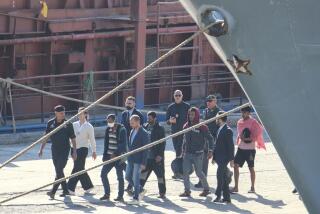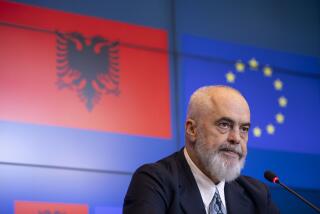Kosovo Refugees Forced on Detour During Trip Back From Pilgrimage
- Share via
KIRKLARELI, Turkey — When 67-year-old Joja Hasan set off for Mecca last month to perform the annual Muslim holy pilgrimage, the hajj, he fervently prayed for a place someday in heaven. “Instead,” the Kosovo Albanian factory worker said, shaking his head in disbelief, “I found myself here, in a refugee camp in Turkey.”
Hasan was among a group of about 200 Kosovo Albanian pilgrims who had traveled by bus from Kosovo to the Macedonian capital, Skopje, nearly a month ago to catch a flight to Saudi Arabia. Having completed their religious duties recently, they were denied permission by the Macedonian authorities to return to Skopje.
“We were at Jidda airport [in Saudi Arabia]; we had our boarding passes. Allah be praised, everything was in order, we thought,” Hasan said. “But at the last minute, we were told that we could not return home. Three days later, we were put on a plane to Turkey.”
Eyub, a young English-language teacher, said Thursday that he and his fellow pilgrims had arrived at this bucolic camp near the Bulgarian border a day and a half earlier. Pointing toward the neat rows of prefabricated huts flanked by lush pistachio trees, Eyub said: “We are being treated extremely well. The Turks are doing their best to make us feel welcome.”
About 2,700 Kosovo Albanians have arrived in Turkey since the beginning of this week, joining about 3,000 others who came here before the start of NATO’s 2-week-old bombing campaign and are mainly scattered among relatives. The overwhelming majority had been stranded at the Macedonian border, where they had spent more than a week with little food and no shelter.
“The Macedonians . . . treated us worse than animals,” said Besa Seyda, a slender medical student from Pristina, the capital of Kosovo, which is a province of Serbia, the dominant Yugoslav republic. Like many here, she had been separated from family members by the Macedonian authorities. And like most, she and her family had been kicked out of her home in Kosovo by Serbian forces.
“[The Macedonians] put me and my brother on one bus and my parents and two other sisters on another,” she said. “I have no idea where they were taken.”
Seyda was waiting with scores of other refugees gathered around the only two telephone booths at the camp. “I will call my uncle in Norway,” she said. “I pray to God he knows where my parents are.”
At the Gaziosmanpasa refugee center Thursday, hundreds of Turkish soldiers were busy putting up tents and ladling out beef stew and rice to long queues of refugees under sunny skies.
The pristine compound, which includes a small, makeshift school, was erected in 1989 to provide shelter for a much larger wave of ethnic Turks from Bulgaria, fleeing persecution by their Communist rulers. More recently it housed Bosnian Muslim refugees--of whom about 300 are still here awaiting repatriation. Many now volunteer as guides for the new arrivals.
Turkey, the North Atlantic Treaty Organization’s only Muslim member state, announced last week that it will take in as many as 20,000 Kosovo refugees from Macedonian camps. The decision followed a sustained campaign by the Turkish media accusing the government of indifference in the face of “genocide of our Muslim brethren.”
Turkey has strong ethnic, religious and cultural ties with the Kosovo Albanians. These date to the days of the Ottoman Empire, when the modern-day Balkan states were ruled by Turkish sultans for more than five centuries. An estimated 3 million ethnic Albanians live in Turkey.
Many of the refugees interviewed here have some knowledge of Turkish. “We keep up our Turkish by watching Turkish channels on satellite TV,” said one teenage girl, reeling off the names of Turkish pop stars and screen actors as she hung up laundry by her hut.
Turkish Prime Minister Bulent Ecevit, who inspected the camp Wednesday, said: “The people of Kosovo are our brothers. Their pains are our pains.”
Ecevit, who is expected to do well in nationwide parliamentary elections April 18, made clear, however, that the Kosovo Albanians are not here to stay. “We call you our guests, not migrants,” he said, “because we want you to return to your homes as soon as possible.”
More to Read
Sign up for Essential California
The most important California stories and recommendations in your inbox every morning.
You may occasionally receive promotional content from the Los Angeles Times.













